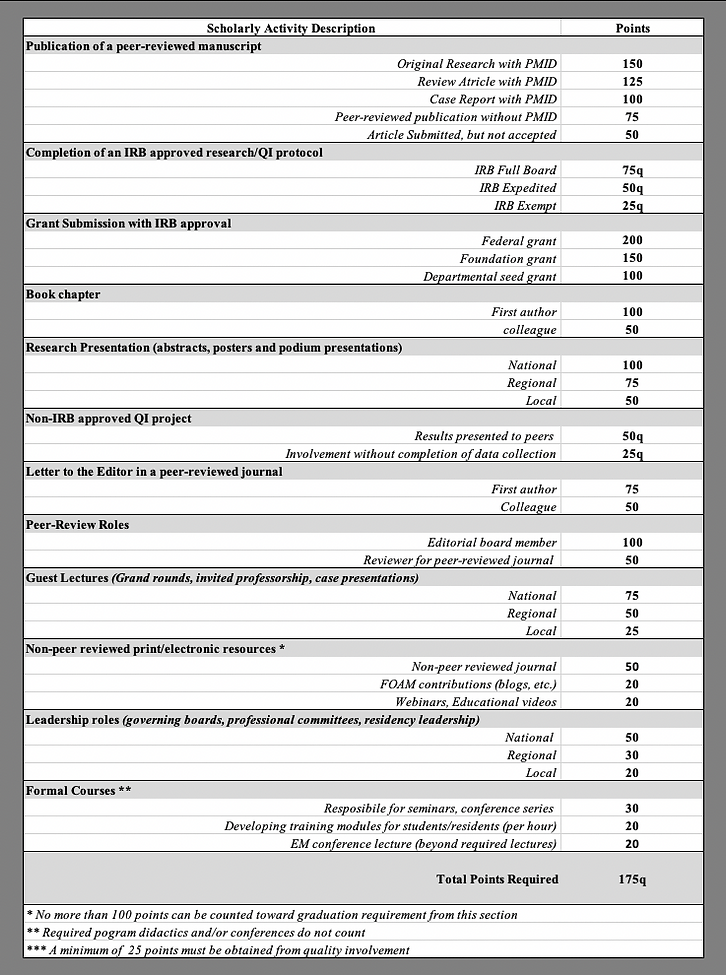"If we knew what it was we were doing, it would not be called research, would it?" - Albert Einstein
Initiative Overview
The West Michigan EM Research Initiative is a quality improvement project designed to improve the basic understanding of scholarly activity that encompasses the 4 inseparable categories of scholarship first described by Ernest Boyer in 1990 and later adopted by the ACGME; Discover (advancing knowledge), Integration (Synthesizing knowledge), Application (applying existing knowledge) and Teaching (disseminating current medical knowledge).

The initiative will focus resources on improving the foundation of various scholarly activities to foster better understanding early on in the residents training. This will include schedules didactic sessions focused on designing, developing and implementing research across various platforms and to provide longitudinal incentive through professional competition.
Residents involved in the CQI initiative will design and deliver educational curriculum to residents via Free Open Access Medication (FOAM) as well as through scheduled classroom didactic session. The steering committee will do quarterly review of resident research achievements and a yearly focus group will be involved in redirecting the long term goals of the project based on resident feedback.
Defining Scholarly Activity
There are two types of scholarly requirements for residency programs: the ACGME requirements and the institutional requirements. The ACGME recognizes the diversity of residencies and expects that the program's scholarly activity will reflect its mission and aims, as well as the needs of the community it serves. Some programs may concentrate scholarly activity on quality improvement, population health and/or teaching, while other programs may choose to utilize more classic forms of biomedical research as a primary focus. Regardless, the program has a duty to facilitate resident and faculty involvement in scholarly activities and advance the residents' knowledge and practice of the scholarly approach to evidence-based patient care. While this recommendation may sound quite vague, some specifics are important to highlight.
According to the ACGME Common Program Requirements...
Elements of a scholarly approach to patient care include:
-
Asking meaningful questions to stimulate residents to utilize learning resources to create a differential diagnosis, a diagnostic algorithm, and treatment plan
-
Challenging the evidence that the residents use to reach their medical decisions so that they understand the benefits and limits of the medical literature
-
When appropriate, dissemination of scholarly learning in a peer-reviewed manner (publication or presentation)
-
Improving resident learning by encouraging them to teach using a scholarly approach
Faculty Scholarly Activity:
-
Among their scholarly activity, programs must demonstrate accomplishments in at least three of the following domains:
-
Research in basic science, education, translational science, patient care, or population health
-
Peer-reviewed grants
-
Quality improvement and/or patient safety initiatives
-
Systematic reviews, meta-analyses, review articles, chapters in medical textbooks, or case reports
-
Creation of curricula, evaluation tools, didactic educational activities, or electronic educational materials
-
Contribution to professional committees, educational organizations, or editorial boards
-
Innovations in education
-
-
The program must demonstrate dissemination of scholarly activity within and external to the program by the following methods:
-
Faculty participation in grand rounds, posters, workshops, quality improvement presentations, podium presentations, grant leadership, non-peerreviewed print/electronic resources, articles or publications, book chapters, textbooks, webinars, service on professional committees, or serving as a journal reviewer, journal editorial board member, or editor; peer-reviewed publication
-
Point System
Several studies have reported success with using various point-based systems to determine fulfillment and spark growth amongst resident and faculty researchers.











